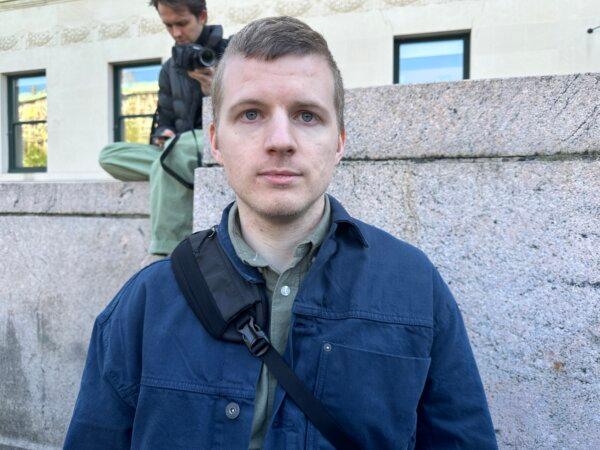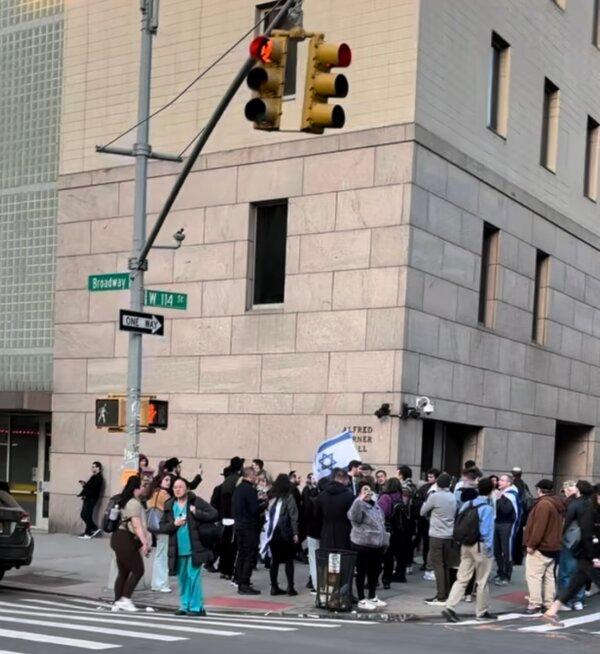Columbia University’s encampment leaders were straightforward in their response to House Speaker Mike Johnson’s visit on April 24, but refrained from commenting on his threat of Congressional intervention.
“Columbia’s welcoming of white supremacists onto campus yesterday contributed to an unsafe atmosphere,” stated Khymani James, encampment spokesperson, on April 25.
“Columbia allowed Gavin McInnes and House Speaker Mike Johnson onto our campus, choosing to appease right-wing extremists instead of listening to their own students,” said Mr. James, a third-year student at Columbia College studying political science.
Mr. James clarified that negotiations with university officials have a timeline rather than a deadline for completion.
Mr. Johnson, along with U.S. Representatives Virginia Fox (R-N.C.), Mike Lawler (R-N.Y.), and Nicole Malliotakis (R-NY), held a press conference on the steps of the library on April 24.
Mr. Johnson addressed a loudly booing crowd, condemning the increase in anti-Semitic sentiments on campus.
“We’re standing here at one of America’s preeminent academic institutions, where the cherished traditions of this university are being overtaken by radical and extreme ideologies,” he said.
When asked about his message to the students in the encampments, Mr. Johnson responded: “Go back to class. … Stop wasting your parents’ money.”
The news conference took place shortly after he called for university president Minouche Shafik to resign over her handling of the protests.
He also mentioned his intention to call President Joe Biden and request the deployment of the National Guard to suppress the protests.
The White House’s response on April 25 to Mr. Johnson’s request to send National Guard troops to address pro-Palestine protests on college campuses indicated that it is seen as a state issue.
“That is something that is under the governors,” White House press secretary Karine Jean-Pierre told reporters aboard Air Force One. “That is something for the governors to decide.”
Earlier this week, Reps. Josh Gottheimer (D-N.J.), Dan Goldman (D-N.Y.), Jared Moskowitz (D-Fla.), and Kathy Manning (D-N.C.) visited the protest encampments set up on the west lawn of the campus along with Jewish students.
Jonathan Ben Menachem, a 29-year-old Jewish fourth-year PhD sociology student at Columbia, expressed concern about Mr. Johnson’s presence on campus.
“Many Jewish students still remain suspended after they were arrested last week, and we’re very concerned about Proud Boys being on campus and maybe other white supremacists,” Mr. Ben Menachem told The Epoch Times. “We’re very confused as to why they’re here.”

While the U.S. House of Representatives cannot call in the National Guard, it could potentially reduce funding to Columbia University and revoke its non-profit status.
“Only state governors and the president can mobilize the National Guard,” explained Mike Zumbluskas, a former GOP candidate for New York’s 12th Congressional District.
“What Congress can do is reduce a lot of the federal research grants that Columbia receives. Congress controls the purse strings. If they cut off a significant portion of their grants, some of the top researchers might seek opportunities elsewhere.”
On April 18, over 100 protesters, including the daughter of Congresswoman Ilhan Omar (D-Minn.), who is a student at Columbia, were arrested. At New York University (NYU), 120 individuals were also arrested this week.
Ms. Omar accompanied her daughter back to campus on April 25.
“Discussions are ongoing,” Mr. James added. “But if Columbia threatens to bring in the National Guard, similar to the incidents at Kent State University or Jackson State, negotiations will cease. Those events involved tragic deaths of student protestors at the hands of law enforcement.”
In 1970, the Ohio National Guard killed four unarmed college students protesting the Vietnam War at Kent State University, while at Jackson State College in Mississippi, a law student and high school student were killed during protests against the U.S. invasion of Cambodia.
University Considering Options
Columbia University Vice President of Communication Ben Chang confirmed that formal negotiations with the encampment leaders are in progress.
“To reiterate, we have our demands, and they have theirs,” stated Mr. Chang at an evening press conference.
“As President Shafik has mentioned, we hope these discussions yield positive results. If not, we will have to explore options to restore peace on campus.”

People Supporting Israel Counter-Protest Near School
Counter-protesters in support of Israel gathered around the school, including participants from the United For Israel March and members of the Christians for Israel group. The march was organized by recent Columbia University graduate Isidore Karten. Despite the peaceful nature of the protest, one pro-Israel demonstrator was arrested on Thursday evening.
Isidore Karten stated, “We’re advocating for the removal of jihadist influences from our school. Our voices were not heard, so we will continue to protest.”
Additional reporting by Savannah Hulsey Pointer.







